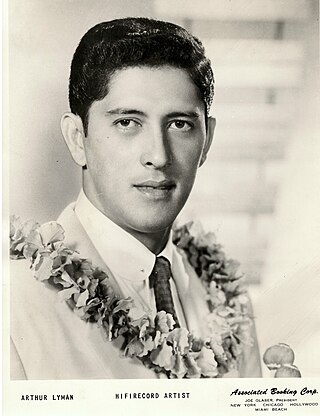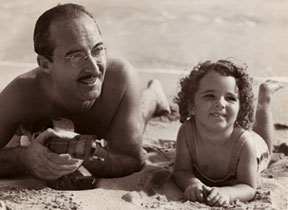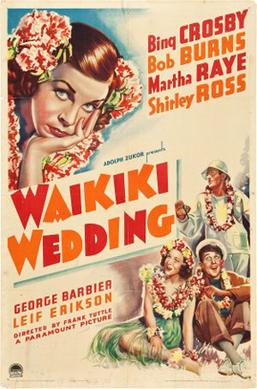
Arthur Hunt Lyman was a Hawaiian jazz vibraphone and marimba player. His group popularized a style of faux-Polynesian music during the 1950s and 1960s which later became known as exotica. His albums became favorite stereo-effect demonstration discs during the early days of the stereophonic LP album for their elaborate and colorful percussion, deep bass and 3-dimensional recording soundstage. Lyman was known as "the King of Lounge music."
The Grammy Award for Best Hawaiian Music Album was an honor presented to recording artists from 2005 to 2011 for quality Hawaiian music albums. The Grammy Awards, an annual ceremony that was established in 1958 and originally called the Gramophone Awards, are presented by the National Academy of Recording Arts and Sciences of the United States to "honor artistic achievement, technical proficiency, and overall excellence in the recording industry, without regard to album sales or chart position".
"Around the World" is the theme tune from the 1956 movie Around the World in 80 Days. In the film, only an instrumental version of the song appeared, although the vocal version has become the better known one. The song was written by Harold Adamson and Victor Young; Young died in 1956, several weeks after the film's release, and he received the Academy Award for Best Music, Scoring of a Dramatic or Comedy Picture posthumously. Young's orchestral version was a #13 hit on the Billboard charts in 1957. The recording by Bing Crosby was the B-side of the Victor Young version in 1957, on Festival SP45-1274 in Australia, and was a joint charting success.

Harry Robert Owens was an American composer, bandleader and songwriter best known for his song "Sweet Leilani".

Waikiki Wedding is a 1937 American musical film directed by Frank Tuttle and starring Bing Crosby, Bob Burns, Martha Raye, and Shirley Ross. Crosby plays the part of Tony Marvin, a PR man charged with extolling the virtues of the Territory of Hawaii. The female lead, played by Shirley Ross is a local beauty queen who makes unhelpful comments about the islands. Bob Burns, along with Martha Raye, are the "comic relief". Amongst the supporting cast was a young Anthony Quinn. It was made by Paramount Pictures as a rival to the Fred Astaire and Ginger Rogers films then being made by RKO Pictures.

"I'll Get By (As Long as I Have You)" is a popular song with music by Fred E. Ahlert and lyrics by Roy Turk that was published in 1928. Versions by Nick Lucas, Aileen Stanley and, most successfully, Ruth Etting, all charted in America in 1929.
The Waikikis were a Belgian studio band, mostly known for their single "Hawaii Tattoo", released in the U.S. in 1964, on Kapp Records. "Hawaii Tattoo" was recorded in 1961 in Belgium and spent two months in the Belgian chart. It was a huge hit in Germany, spending 21 weeks in the Top Ten and also reached the Top Fifty in the U.S., Canada and the UK.
Hawaii Calls was a radio program broadcast live from Waikiki Beach from 1935 through 1975 that reached 750 stations world-wide at the height of its popularity. It featured live Hawaiian music by an 11-piece dance orchestra conducted by Harry Owens, the composer of "Sweet Leilani". The show selected the best musicians and singers, with the purpose of showcasing what authentic Hawaiian music is like when played by native performers, but with one major difference—the lyrics were sung in English and intended for white audiences. Hawaiians called this hybrid with English hapa haole (half-white).
Lani McIntire was a Hawaiian guitar and steel guitar player who helped to popularize the instrument, which eventually became a mainstay in American country and western music. He played frequently with his brothers — steel guitar legend Dick McIntire and bassist Al McIntire.

"The Hukilau Song" is a song written by Jack Owens in 1948 after attending a luau in Laie, Hawaii.
"Blue Hawaii" is a popular song written by Leo Robin and Ralph Rainger for the 1937 Paramount Pictures film Waikiki Wedding, starring Bing Crosby and Shirley Ross. Crosby recorded a version with backing by Lani McIntyre and His Hawaiians, which was released in 1937 as the B-side of "Sweet Leilani." This reached the No. 5 spot in the charts of the day during a 13-week-stay

Benjamin Kapena Kalama was an American singer with a honey-voiced falsetto. He is credited with discovering and nurturing Alfred Apaka, and was part of several groups. Until the day Apaka died, Kalama was coaching and arranging music for him.
"Beyond The Reef" is a song written by Canadian Jack Pitman in Hawaii in 1948. It was first performed by Hawaiian artist Napua Stevens in 1949.

To You Sweetheart, Aloha is the fourth studio album by American pop singer Andy Williams and was released late in the summer of 1959 by Cadence Records. This, his fourth LP for the label, has a Hawaiian theme that coincides with the admission of the 50th of the United States.
"The Moon of Manakoora" is a popular song written by Frank Loesser (lyrics) and Alfred Newman (music) for the 1937 Paramount film The Hurricane starring Dorothy Lamour. Lamour sang the song in the film and also made a commercial recording of it. The song "The Moon of Manakoora" is considered a standard and was Loesser's first success as a lyric writer.

Favorite Hawaiian Songs is a compilation album of phonograph records by Bing Crosby released in 1940 featuring songs that were sung in a Hawaiian-type genre. This is the second album release of many of Crosby's Hawaiian hits such as: Blue Hawaii and Sweet Leilani.

Favorite Hawaiian Songs, Volume One is a compilation album of phonograph records by Bing Crosby released in 1946 featuring songs that were sung in a Hawaiian-type genre. This was the fourth Hawaiian-themed album release for Crosby.

Favorite Hawaiian Songs, Volume Two is a compilation album of phonograph records by Bing Crosby released in 1946 featuring songs that were sung in a Hawaiian-type genre. This was the fifth Hawaiian-themed album release for Crosby.

Charles Keonaonalaulani Llewellyn Davis was a Native Hawaiian opera singer and musician. He was a child prodigy, raised on a sugar cane plantation, and a direct descendant of John Papa ʻĪʻī, personal attendant to Lunalilo. Trained as an opera singer, he vocalized in both tenor and baritone ranges. He and actor James Shigeta briefly toured as a nightclub act. Versatile with a variety of vocal forms, and a multi-linguist, he sang the music of Cole Porter at the Hollywood Bowl, and presented a concert in honor of Kamehameha Day at Carnegie Hall. Davis performed with the Opera Company of Boston during a White House engagement, and was a nightclub performer in Hawaii. He received the Lifetime Achievement Award from the Hawai'i Academy of Recording Arts, and was inducted into the Hawaiian Music Hall of Fame.

Hapa haole music is a genre of Hawaiian music which utilizes primarily English lyrics with themes and instruments attributed to Hawaii, such as the ukulele and steel guitar. Although it has its beginnings in the early 20th century with influences from traditional Hawaiian music and American ragtime, the term "hapa haole" now comprises a wide variety of styles, including swing, rock and roll, and rap. It became greatly popular in the mainland United States in the 1910s, appealing to touristic perceptions of Hawaii as an exotic paradise.












